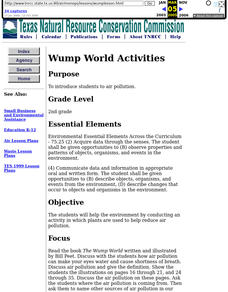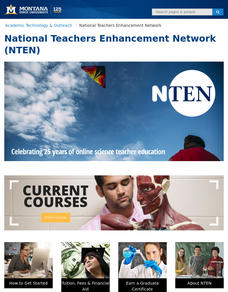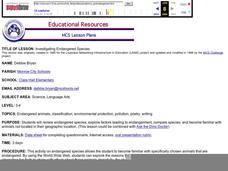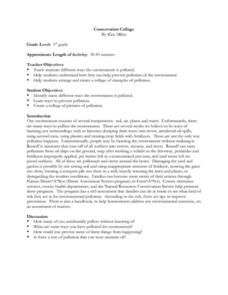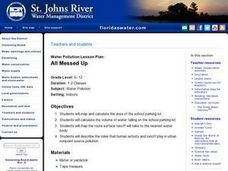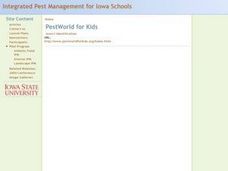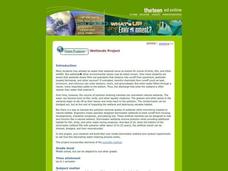Curated OER
Water Pollution Graphing Activity
Young scholars describe and identify the link between land use activities within a watershed and water quality. They evaluate the quality of a "water sample" ( a bag of skittles), graph their results, and form a hypothesis about the land...
Curated OER
Wump World
Second graders read ead the book The Wump World written and illustrated by Bill Peet. Discuss with the students how air pollution can make your eyes water and cause shortness of breath. Students discuss air pollution and give the...
Curated OER
Take a Dip: The Water in Our Lives
Students explore the function of storm drains and the importance of keeping them clean of debris. They obtain permission from local authorities and perform community service painting stenciled messages near existing storm drains.
Curated OER
Household Hazardous Waste Identification
Fourth graders learn about reduce, reuse, and recycle and identify household hazardous products. Students learn about less hazardous alternatives and complete an inventory of hazardous materials in a typical household.
Curated OER
Toxics Lesson Plan
Students discover that chemicals and toxics are all around us and we can make a choice whether or not to use them.
Curated OER
Do Human Practices Affect Water Quality?
Students determine if human practices have any noticeable effects on the quality of stream life as measured by the presence of certain macroinvertebrates. They collect, preserve and identify macroinvertibrate samples and quantify the data.
Curated OER
Investigating Endangered Species
Young scholars pick an endangered animal to research and report their findings to the class.
Curated OER
Conservation Collage
Learners identify many different ways the environment is polluted, and determine ways to prevent pollution. They create a collage of pictures describing how the earth becomes polluted.
Curated OER
All Messed Up
Pupils begin the experiment by mapping and calculating their school parking lot. They calculate the volume of water falling on the lot and map the route the water runoff takes. They discuss the roles that humans play in affecting water...
Curated OER
What's The Flow?
Students examine urban runoff and identify peak flows. They examine causes for different flow rates, and complete worksheets and a graph.
Curated OER
Petroleum Poisons
Students discover how harmful petroleum distillates are that are found in the home. They demonstrate how to collect information about consumer products. They also ask their parents about the safety of the cleaning supplies used in their...
Curated OER
Household Hazardous Waste Identification
Fourth graders discuss the concept of reduce, reuse and recycle. They identify products in their homes that are hazardous and discover alternatives to them. They examine the inventory of other classmates hazardous materials.
Curated OER
The Numbers Game
Students examine how to calculate the part-per-million and part-per-billion units used to measure contaminant concentrations in the environment. They calculate ratios, take a quiz, analyze a sample chemical spill, and determine if...
Curated OER
Environment: Mealworm Observations
Students observe plant and animal growth and participate in class discussions about the subjects. They also record their observations in a log. Using observation and the scientific method, they describe the characteristics of mealworms.
Curated OER
Bald Eagle Population Graphing
Pupils create graphs to illustrate the bald eagle population. They identify the population of bald eagles in Minnesota and the United States. They create three graphs to represent the population data including a line, bar, and...
Curated OER
Solubility and Chemical Changes in Groundwater
Young scholars test pH of water before and after it travels through different substrates (igneous pebbles and limestone) to detemine how soluble materials can affect groundwater. They answer questions such as: What happended to the pH of...
Curated OER
Wetlands Project
Students discover how wetlands filter out contaminants before they can reach other bodies of water. In groups, they design and build a model of a stormwater wetland. They test the water quality and inform their classmates about the...
Curated OER
Lead Poisoning and Ceramic Dishes
Students explore the amount of lead in ceramic plates through an experiment. Students determine if everyday dishware is leaching lead into food. They chart their results and discuss how much lead in ceramic dishware may cause lead...
Curated OER
Local Environmental Issues: Pollution
Third graders discuss the ways in which human interaction with the environment and production of waste products contribute to pollution. Through a pollution demonstration, they explain how various groups of plants and animals can be...
Curated OER
Blowing in the Wind
Students identify and interpret maps, graphs, charts, tables and political cartoons. Students identify what a compass rose is and review its meaning in relation to standard directions. Students design their own weathervanes. Students...
Curated OER
Nanaotechnology: Small Science, BIG DEAL!
Students read an article that introduces them to the science and applications of nanotechnology. They discuss the the everyday examples of how nanotechnology is and can be used. In small groups, they observe and make inferences about...
Other popular searches
- Pesticides Food
- Harmful Pesticides
- Pesticides and Their Harm
- Pollution Pesticides
- Comparing Pesticides
- Pesticides for the Farm
- Agriculture Pesticides
- Pesticides and the Danger
- Synthetic Pesticides
- Pesticides and Insect
- Chemical Elements Pesticides
- Herbicides and Pesticides



